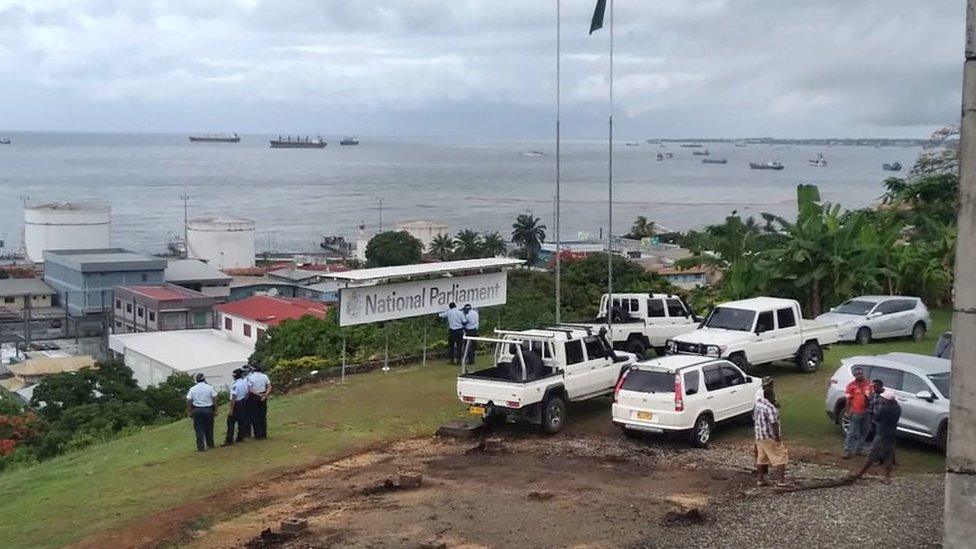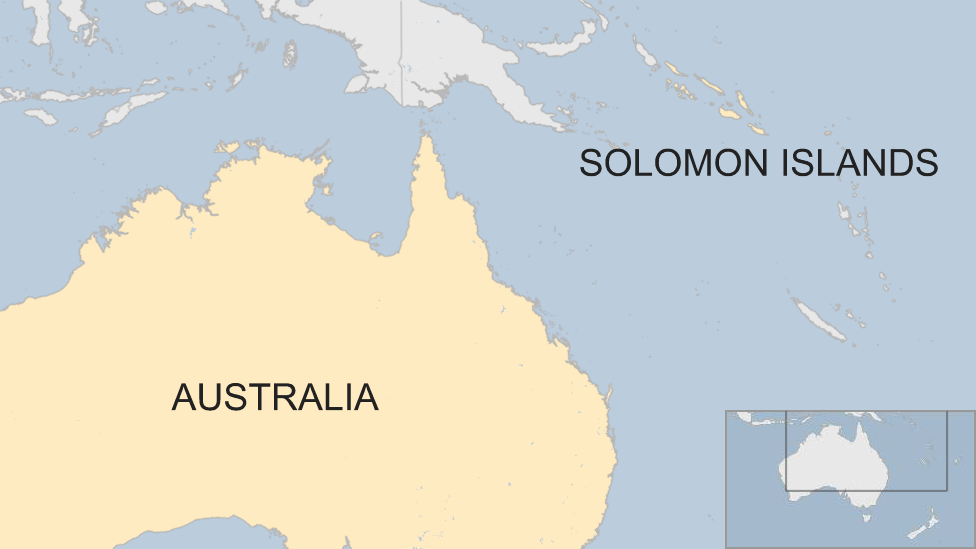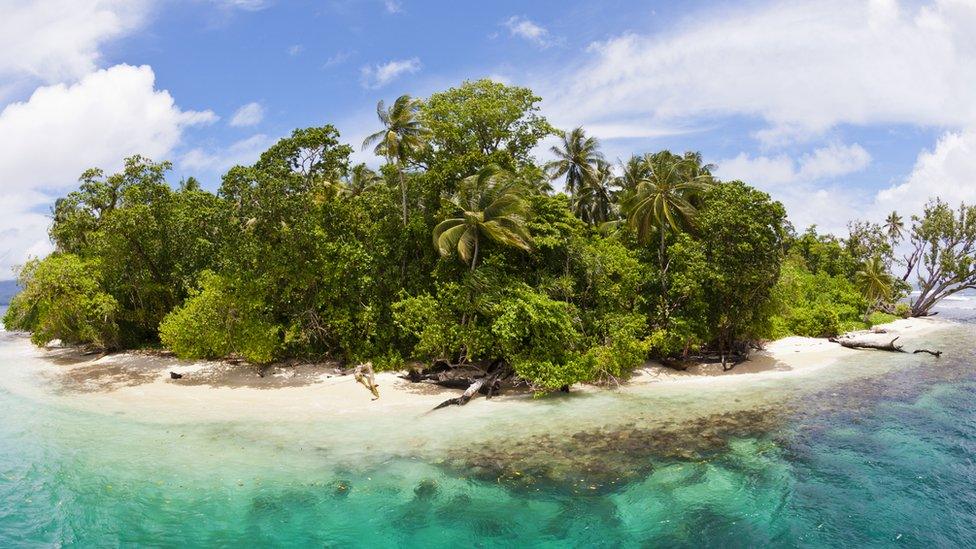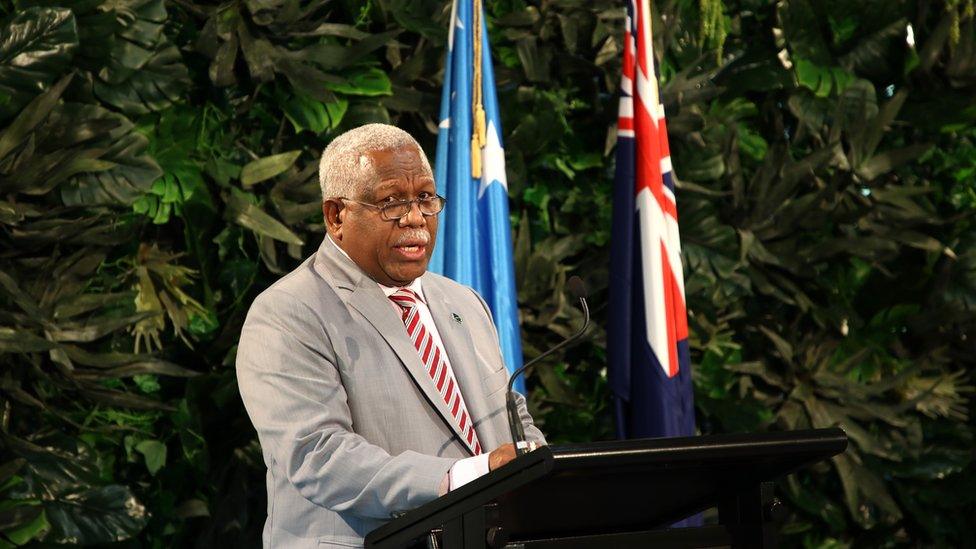Solomon Islands confirms China security draft, alarming Australia
- Published

The Solomon Islands has seen rioting and political unrest in recent months
Solomon Islands has confirmed it is drafting a security deal with China - a move that's triggered alarm in neighbouring Australia and other Western allies in the Indo-Pacific.
Leaked papers indicate a Chinese military base could potentially be set up on the island to Australia's north.
That's sparked concern from Australia, long the chief defence partner and biggest aid donor to the tiny island.
Both Australia and New Zealand said it had raised concerns with Honiara.
Australia's Foreign Minister Marise Payne said she respected the Pacific island's right to make sovereign decisions but:
"We would be particularly concerned by any actions that undermine the stability and security of our region, including the establishment of a permanent presence such as a military base."
New Zealand said it was also concerned as the plan threatened to "destabilise the current institutions and arrangements that have long underpinned the Pacific region's security."
The Solomon Islands did not confirm the details of the leaked draft agreement, or if it was the finalised version.
But on Friday it said it was "expanding" security arrangements with more countries and "diversifying the country's security partnership including with China".
China could deploy forces
The details of the leaked plans have particularly concerned Australia, which is just 2000km (1,400 miles) south of the Solomon Islands.
The papers set out a framework which could allow Beijing to deploy forces to "protect the safety of Chinese personnel and major projects in Solomon Islands".
The tiny Pacific nation could also "request China to send police, armed police, military personnel and other law enforcement and armed forces", according to the document.
There is also provision for China to "make ship visits, to carry out logistical replenishment in, and have stopover and transition in Solomon Islands".
Security analysts say the plans reveal China's clear intention in the region for the first time.
"It shows in black and white what China is asking for and in some ways has done Australia a favour," said Jonathan Pryke, a Pacific Islands analyst at Australia's Lowy Institute thinktank.
"We are at the start of a long process before we would see any sort of boots on the ground or form of military presence in the Solomon Islands... but it is worrying to see just what China's intent is," he told the Australian Broadcasting Corporation.

On Friday, Honiara emphasised that any strategic partnership with China would include a "development dimension". It was working to "sign off and implement" several deals with China including trade expansion and a civil aviation services agreement.
But it added it also welcomed police training and equipment offered by its "two major partners China and Australia."
Australia has been increasingly concerned about China's growing influence in the Indo-Pacific region, and has tried ramping up aid spending to curtail that in recent years.
In 2018, it launched the 'Pacific Step Up' policy to re-engage with its "Pacific family." It also set up a multi-billion dollar infrastructure fund widely seen as a counter to China's loans and spending in the region.
Despite this, Honiara has drawn closer to China, establishing formal diplomatic ties in 2019 and ditching its links with Taiwan.
On Friday, former Australian PM Kevin Rudd called the plan "one of the most significant security developments we have seen in decades" and a defence failure by the current Australian government in its "own territorial waters".
Following riots on the Solomon Islands last year year, Australia sent troops to the island and re-established a previous long-term policing mission. China also offered training for the island's police.
In February, the US said it also planned to re-open its embassy in the Solomon Islands amid concerns about China's plans in the region.
The US, UK and Australia all signed a landmark defence treaty last year, nicknamed Aukus, to strengthen Western allies' presence in the Indo-Pacific.
Reporting by the BBC's Frances Mao
You may also be interested in:
Last year, Solomon Islands government buildings and businesses were set ablaze amid unrest
Related topics
- Published12 February 2022

- Published25 November 2021

- Published13 June 2018
